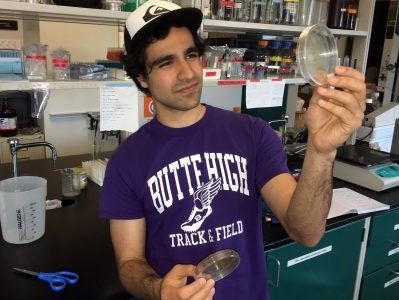Gonzaga Biochemistry Major Chad Hicks Receives Howard Hughes Medical Institute Internship
Monday, May 1, 2017

By Megan Carroll
Class of 2018
SPOKANE, Wash. – Gonzaga University biochemistry major Chad Hicks, a gifted science scholar, will take a step toward his goal of becoming a research professor through a prestigious internship this summer at Emory University in Atlanta, Georgia, through the Howard Hughes Medical Institute Exceptional Research Opportunities Program.
Hicks, a rising senior from Butte, Montana, will study in the research lab of Emory Professor David Lynn, an internationally recognized researcher in biomolecular chemistry, molecular evolution and chemical biology, the evolution of biological order and the origins of life. Specifically, Hicks will focus on structures associated with brain and nervous system disorders such as Alzheimer’s disease.
Gonzaga Professors Kirk Anders, biology, and Jeff Watson, chemistry, nominated Hicks for the internship that includes a stipend and attendance at summer conferences featuring the previous year’s interns. Hicks is among 67 students nationwide chosen for the program this year and the sixth Gonzaga student chosen since 2010. As a member of the HHMI EXROP program, students have access to future opportunities including graduate fellowships.
In 2012, Gonzaga received a $1.2 million HHMI grant, allowing its science faculty to better develop students as socially responsible leaders in science, research and medicine. In 2008, Gonzaga was among 48 of the nation’s best undergraduate schools to share $60 million from HHMI to help usher in a new era of science education in the United States.
Hicks says he would not have received the internship without the help of GU Professors Anders, Watson and Nancy Staub, biology. Hicks began doing undergraduate research in Watson’s lab the summer after his freshman year, and has continued the work in subsequent academic years and summer semesters. The lab studies a key enzyme in bacteria that affect people with compromised immune systems, such as those with cystic fibrosis.
“I would not be in this position if I wasn’t at Gonzaga, and did not have great mentors,” he said. “I attribute a lot of my success to my professors’ guidance and mentorship. Research has been the most rewarding part of my Gonzaga experience.”
Staub says research is an integral component of scientific learning at Gonzaga. The biology department recently changed its curriculum so all students, including those in introductory courses, participate in research.
Science has always fascinated Hicks. From an early age, he conducted experiments, built structures and examined the solar system. Hicks credits Maureen Driscoll, his chemistry teacher at Butte High School – where he was valedictorian in 2014 – with inspiring and encouraging him to pursue a career in the sciences.
Upon entering Gonzaga, Hicks thought he would pursue medical school after graduation. After discovering passions for research in Watson’s lab and teaching through his work as a teaching assistant, Hicks now hopes to earn a doctorate and become a professor so he can teach and conduct research at a university.
“What the professors are doing here at Gonzaga is what I want to do as a career,” he said. “I like the freedom of having my own project, deciding where I want to go and solving my own problems. That’s a lot of what I’ve been doing with Dr. Watson.”
Staub also sees a teaching career in Hicks’ future, and described him as logical and curious.
“He’s the type of person who could be successful in a number of different professions, but I can see him as a professor somewhere, engaging students in learning science and engaging graduate and undergraduate students in high-caliber, meaningful research,” Staub said. “I think he will be eager for a career that keeps him intellectually engaged.”
Hicks also plays intramural sports at Gonzaga, served as president of the Gonzaga Running Club, tutors fellow students, and is a Gonzaga Science Scholar.
For more information, please contact Professor Nancy Staub at (509) 313-6636 or staub@gonzaga.edu.